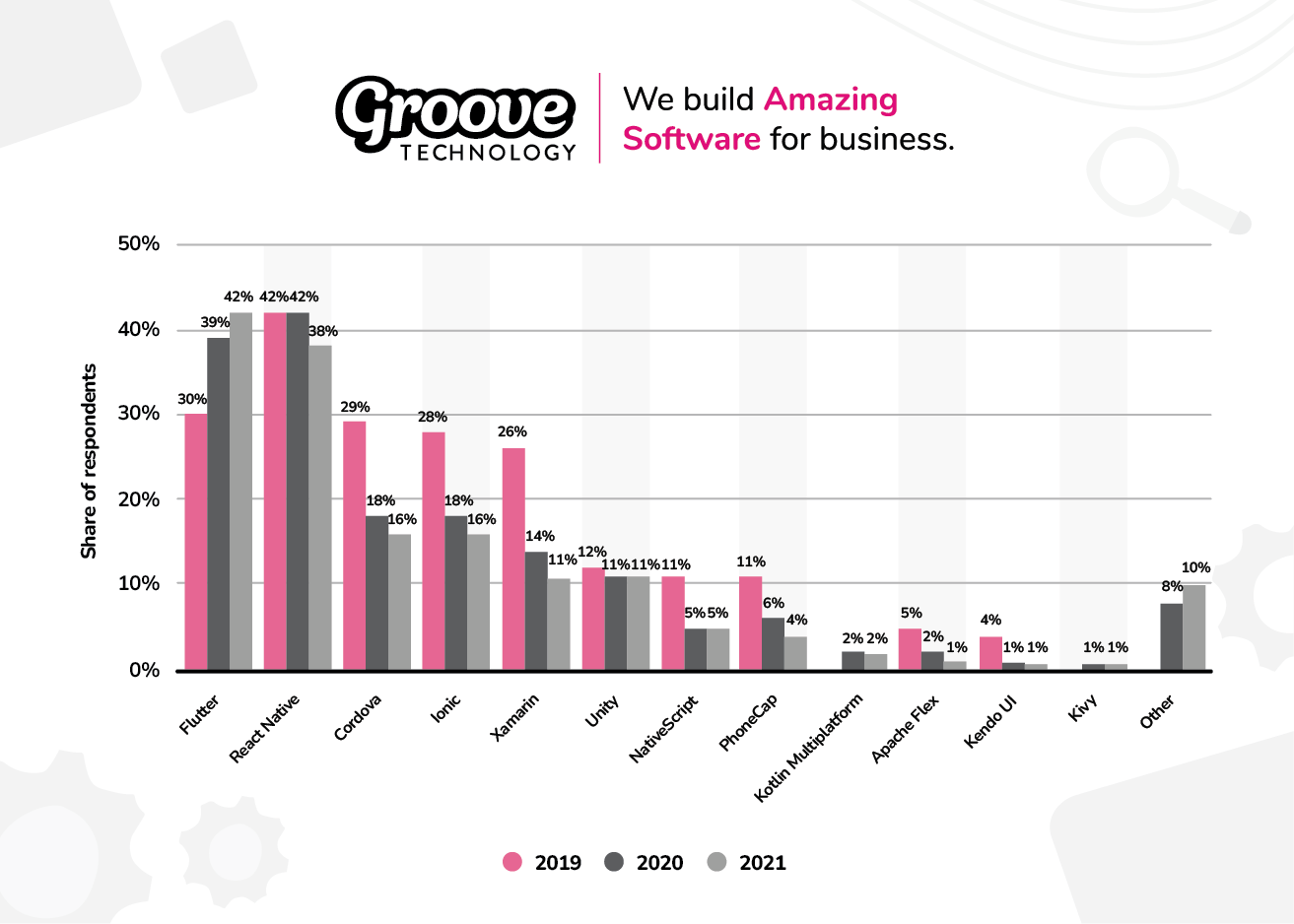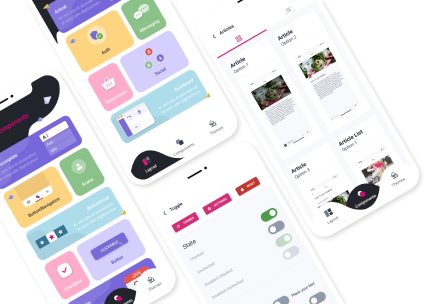The Best Hybrid Mobile App Development Frameworks in 2022
Having a mobile presence has become essential for businesses to survive and reach a broader audience in today's tech-driven society. However, there is no assurance of success simply because you released your software onto the mobile market.
You need to conduct an extensive market analysis, develop a strategy, and evaluate the entire mobile environment to flourish in a highly competitive mobile market. The ideal framework for scalability and the creation of mobile apps should be chosen above all else.
Market Research Future projects that by 2022, the global market for mobile app development will have grown at a CAGR of 14% and will be worth $100 billion. Although there are many hybrid mobile app development frameworks available, this blog will focus on the top 6 that are crucial for your company.
What is Hybrid Mobile App Development Framework?
The term “hybrid app development” refers to the combination of native and web app development. The best cross-platform framework is required because hybrid programs are created for multiple platforms. HTML, JavaScript, and CSS are among the web technologies used in the development of these applications.
They are not faster than natives but easier and faster to construct. Several benefits of hybrid mobile app development include cost savings and the ability to create each app using a single code base that can be used to develop apps for many platforms.
In order to better comprehend hybrid apps, let's quickly define native and online apps.

A hybrid app is simply a web app with certain native platform functionality, such as push notifications, the device's camera, calendar, and GPS. A hybrid app can also access the functionalities of a mobile device by using plugins.
Like native software, a hybrid app may be downloaded from the app stores and installed on your mobile devices to access it.
What Benefits Do Hybrid Mobile Apps Offer?
Many major corporations, including Amazon, Walmart, and Nike, already favor hybrid app development over native app development. You would have realized that mobile apps for organizations have a number of benefits.
The cost of app creation is lower for hybrid apps compared to native apps, which is one reason to choose them. Since there is only one codebase to maintain, hybrid apps can be developed more quickly. But what's next? Let's talk about each of these advantages in this part.
Improved UX/UI. The benefits of native and web apps are combined during hybrid mobile development. It provides a faultless and uniform user experience on both iOS and Android platforms. It's about embracing the web and adapting it for mobile.
Additionally, the lightweight hybrid app UI facilitates speedy loading of material and visuals. The apps adjust to diverse device screens to provide speedy data display and flawless data streaming. The outstanding UI experience increases the likelihood of the app store approving the program.
Increased market reach
They are ideal for addressing several platforms with a single solution. Reaching a large number of users utilizing various mobile platforms becomes a profitable and cost-effective alternative in this cutthroat market.
Shorter timeframe for development
The fact that hybrid mobile apps may be created more quickly and easily than native apps is one of their key benefits. It enables businesses to use their current web development toolkit without constructing a new codebase for every platform. The code is written with an understanding of HTML and JavaScript, and the program runs on all main operating systems.
Easily Maintained
Development of hybrid mobile applications allows streamlined maintenance. When updating native apps, the development teams must release new versions for each platform. By doing away with versioning, hybrid apps enable real-time app administration that is as simple as changing a web page.
Cost-effective
By using this strategy, many platforms can be targeted without the need to maintain numerous code bases. The hybrid apps allow development teams to move more quickly because they have a single code base for all platforms, unlike native apps. The time to market is drastically shortened. With a single code, the program may be published on numerous mobile app marketplaces.
Online Discontinuity
Limitations in mobile applications brought on by a lack of offline support are widespread. Businesses that serve people in remote areas or in locations with poor internet connectivity have difficulties. According to statistics, a long loading time causes 70% of users to exit an app. The capability of offline accessibility aids in overcoming this difficulty. As a result, end users can access the app's data continuously and without experiencing any performance issues.
Performance Improvement
Like native apps, hybrid apps have a high rate of speed and performance. They sometimes even outperform progressive and responsive apps in terms of speed. The lack of reliance on network connectivity is the cause. Furthermore, apps run faster on all devices, including those with a higher user base. Their performance requirements have been demonstrated with companies like Twitter and LinkedIn.
Top 6 Hybrid Mobile App Development Frameworks
According to Statista's analysis, Flutter has surpassed all other hybrid mobile app development frameworks in terms of popularity. With an impressive 42% of the market, it has been chosen by iOS developers and app owners worldwide. The second most popular framework in the group is React Native.

In light of this, let's examine the top hybrid mobile app development frameworks available today that can satisfy your needs for creating cross-platform apps.
React Native
The greatest JavaScript library for creating native applications across all platforms and devices is React Native. You can create robust applications for iOS and Android with React Native. Additionally, it enables the easy use of a single codebase across numerous platforms by allowing the creation of platform-specific versions of various components. Facebook released this community-driven JS library in 2018.
Important React Native Benefits
- Broad developer community support.
- Robust performance akin to the Native.
- Provide a live and hot reloading functionality that immediately displays the results of code changes.
- Modular architecture with insight for smooth updates and upgrades.
- Improved code reuse for the iOS and Android operating systems.
- Node Package Manager facilitates a simple installation process (NPM)
Flutter
In 2022, one of the top mobile development frameworks will be Flutter, created by Google. A single codebase can be used to build cross-platform applications using this open-source framework.
Given that it employs a novel method for creating cross-platform programs with a native-like look and feel, it is a great SDK (software development kit). Flutter is a mobile user interface that is unmatched and incredibly reliable for generating engaging applications quickly by accelerating the development process.
To help programmers create and develop appealing mob applications, the Flutter framework includes widgets, a rendering engine, testing, and a number of other tools. Reputable businesses like Alibaba, Google, and Abby Road Studios employ the flutter framework.
Flutter's features include:
- Support for powerful widgets
- Designed materials built-in
- Motion-rich APIs
- Performance-oriented software comparable to native
Xamarin
Microsoft created the open-source Xamarin framework to enable developers to produce superior native Android, iOS, tvOS, macOS, and watchOS applications using the C# and.NET programming languages. Additionally, it enables users to swiftly move scripts between other operating systems, including Windows and macOS.
Enterprises are permitted to provide quick speed and cutting-edge end-user experience thanks to the Xamarin framework. A large community that supports the framework works with the designers to create environments with diverse components, APIs, backends, and other features by using various tools, programming languages, and libraries.
Among Xamarin's features are:
- An app's native experience
- Files for storyboards
- Compatibility with a variety of devices
- Flexible backend architecture
- Android SDK administrator
Ionic
A complete open-source SDK for creating hybrid mobile apps is the Ionic Framework. It offers resources and assistance for creating hybrid mobile apps with HTML5, CSS, and Sass. By utilizing Cordova, apps may be created using these Web technologies and then distributed through native app stores to be installed on devices.
This framework is entirely free and open-source, is MIT licensed, and is supported by a sizable global community. With Cordova/PhoneGap plugins and TypeScript extensions, they have access to more than 120 native device functionalities, including Bluetooth, HealthKit, fingerprint authentication, and others.
Your Ionic apps may be built, tested, and deployed using their CLI on any platform. Hundreds of the most popular app icons are included in the framework's Ionicons icon pack. Additionally, you can create apps using Live Reload as compiling and re-deploying apps at every stage of development is for amateurs. Deep linking, AoT Compiling, and a unique animations API are a few additional helpful features.
Ionic is a complete framework that enables programmers to construct hybrid, cross-platform, and PWA (Progressive Web Application) mobile apps. It is an open-source framework created with Angular and Apache Cordova (PhoneGap), allowing developers to create strong native apps with lots of features.
Ionic's ability to let developers integrate different UI components including navigation menus, forms, input, filtering, views, and action sheets in the app framework is only one of its many advantages. To create appealing and user-friendly mobile apps based on the Ionic framework, you can engage mobile app developers.
Ionic's characteristics are:
- UI elements that are interactive
- Rapid time for development
- Solid development environment
- Total command over the creation of apps
NativeScript

Another open-source framework for creating cross-platform apps that support CSS, JavaScript, Angular, Typescript, and Vue.js is Native Scripts. It is a popular framework to speed up application loading and reduce the amount of code.
Because of its powerful capabilities, Native Scripts is used by many top businesses. It offers appropriate backend assistance, complete access to iOS and Android APIs, native user interfaces devoid of web views, business assistance, etc.
Among Native Script's features are:
- Strong backend assistance
- Full access to the APIs for iOS and Android
- Essential business assistance
- No WebViews in the native UI
Onsen UI
Because of its effective UI foundation, hybrid mobile apps may be created by app developers fast and affordably. It is an open-source UI framework and a set of parts used to create HTML5 hybrid mobile applications. It is built on PhoneGap/Cordova.
Because Onsen UI is compatible with AngularJS and jQuery, developers may easily design a variety of UI/UX components. It helps programmers to create incredible mobile apps by utilizing web technologies like HTML5, JavaScript, and CSS.
Major Advantages of Onsen UI
- It enables the creation of mobile apps without the need for a JavaScript framework.
- Gives mobile apps access to a variety of UI components and automatic styling.
- Enables the quick and simple creation of stunning HTML5 hybrid applications.
- To improve the performance of hardware and devices, it is carefully optimized.
- It works with Monaca, a powerful tool for creating HTML5 mobile hybrid apps.
- Enables the creation of mobile applications without the need to install the iOS/Android SDK.
Conclusion
This post is meant to assist you in selecting the best framework for your hybrid app development projects and boosting your online presence. The choice of framework depends on your business strategy and the needs of your app, even though each of them offers its own bouquet of advantages. Prioritizing your app's objectives and goals will help you choose a hybrid mobile app framework. After that, you may assess which framework best meets your needs. Contact our consultants for mobile app development if you have any questions.
Groove Technology is a reputable hybrid mobile app development business. To create outstanding hybrid apps, our specialists have a wealth of experience with the frameworks and technology used in hybrid mobile app development. All you have to do is discuss your business concept with us, and we'll turn it into a compelling reality. Contact us as soon as possible!









